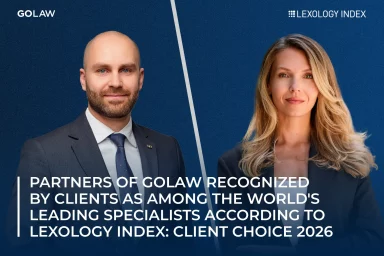News digest | June 2025
Contents
Corporate Law Practice
Updated rules for checking UBO and ownership structure: new deadlines and grounds for suspension of document review
As of 13 June 2025, changes to the procedure for verifying information on the ultimate beneficial owner (UBO) and ownership structure of a legal entity have come into force, as set out by Order No. 1861/5 of the Ministry of Justice. These changes clarify how a state registrar should act if incomplete or improperly prepared information is submitted.
From now on, if the ownership structure is submitted without the required documents or drawn up incorrectly, the registrar must issue a decision to suspend the review on the same day the documents are received. In such cases, no changes will be made to the Unified State Register, and the submitted documents will be returned to the applicant.
The amendments also set a maximum timeframe for verifying the ownership structure — no more than 10 working days. If any inconsistencies are found during this period, or if the submitted data is not confirmed, the registrar may refuse to update the register.
A new requirement has also been introduced for ownership structure charts: they must be signed by the head of the legal entity and include full details of all individuals with significant influence. It is also now clearly stated that all documents confirming UBO and ownership structure must be submitted along with the registration application.
These updates clarify the registrar’s powers and aim to improve the quality of information entered into the legal entities register.
Ukraine to launch an Online Business Cabinet via the “Diia.Business” platform
On 11 June 2025, the Cabinet of Ministers approved the creation of an “Online Business Cabinet” as part of the “Diia.Business” platform. Prime Minister Denys Shmyhal announced the decision during a government meeting, citing the official Government Portal.
The main goal of the project is to provide more personalised support for small and medium-sized businesses by offering relevant assistance programmes and helping them grow.
According to the Ministry of Digital Transformation, the service will be rolled out as a two-year pilot. It will operate within a national electronic system for business support, regulated by a government resolution that outlines all features of the Online Cabinet.
Key features include:
Automated push notifications in the “Diia” app with direct links to the relevant section on the portal;
Personalised business recommendations (if the user opts in to share their data via Diia);
Use of anonymised data from tax and justice registries to group businesses by their needs;
Collection of user feedback and monitoring of the effectiveness of state support.
The functionality has already been tested and is now undergoing technical checks. The service will be officially launched once full data uploading is completed. The Entrepreneurship and Export Promotion Office will be responsible for its administration.
Parliament backs changes to LLC law: additional capital to be allowed
On 4 June 2025, the Verkhovna Rada passed draft law No. 13002 in its first reading, proposing to amend legislation to allow the creation of additional capital in limited and additional liability companies. The bill received support from 253 MPs.
The draft law amends Article 12 of the Law of Ukraine “On Limited and Additional Liability Companies”. In particular, the article is to be renamed “Authorised Capital and Additional Capital of the Company” and will include a new provision allowing participants to contribute cash, securities or other assets to the company without increasing its authorised capital. The procedure and conditions for such contributions will be determined by a resolution of the general meeting of participants.
According to Yaroslav Rushchyshyn, Secretary of the Economic Development Committee, the current version of the law lacks a clear mechanism for these types of contributions, which makes it harder to attract investment under Ukrainian law.
The bill aims to close legal gaps and create more predictable conditions for financing the operations of such companies.
The Verkhovna Rada improved the Public-Private Partnership mechanism
On 19 June 2025, the Verkhovna Rada of Ukraine adopted Draft Law No. 7508 aimed at improving the mechanism of public-private partnership (PPP). The bill was supported by 256 Members of Parliament. The law is designed to simplify the preparation and implementation of PPP projects, particularly those related to the restoration of infrastructure damaged by war and the construction of new facilities as part of the post-war economic recovery.
Among the key changes are the introduction of an electronic procurement system for PPPs in line with EU standards and the full implementation of PPP projects financed from the state budget without transferring demand risk to the private investor. This model will enable the state to implement infrastructure projects on a deferred payment basis, which is crucial for Ukraine’s rapid recovery.
The procedures for preparing PPP projects at both the state and local levels have also been simplified, especially for small-scale projects worth up to EUR 5.3 million. The law harmonises PPP rules with concession legislation and provides for the use of external donor support, which is particularly relevant for de-occupied and war-affected regions.
According to Dmytro Natalukha, Chair of the Parliamentary Committee on Economic Development, this law creates a modern legal framework for PPP development and opens the door for private investment in the restoration of schools, hospitals, roads, bridges, ports, housing, kindergartens, power grids, and water supply – all essential components for ensuring decent living conditions for citizens.
Tax Law Practice | Tax Alert
Draft Law on investment compensation through taxes registered
On June 25, 2025, the Verkhovna Rada of Ukraine registered Draft Law No. 13415 “On Amendments to Section XX “Transitional Provisions” of the Tax Code of Ukraine on Investment Compensation through Taxes”.
According to the explanatory note, the draft law was developed with the aim of attracting large-scale investments into Ukraine’s processing industry.
The draft law proposes granting tax and customs benefits to investors included in the Register of Investors in the Processing Industry, in the following forms:
- exemption from certain taxes and fees (in particular, VAT on the import of specified new equipment for the purpose of implementing an investment project; corporate income tax under certain conditions; partial or complete exemption from land tax and rent for state- or municipally-owned land);
- exemption from import duties on new equipment and components imported exclusively for the implementation of a processing industry investment project, in accordance with the Customs Code of Ukraine.
The maximum amount of tax and customs benefits available to an investor would depend on the actual amount of investment made in the investment objects during the implementation period of the processing industry project.
These benefits would apply to legal entities registered and operating in Ukraine within the processing industry, subject to certain exceptions.
Additionally, the draft law limits each taxpayer included in the Register of Investors in the Processing Industry to implementing no more than one investment project in the processing industry.
A key feature of this initiative is that it applies not only to newly established enterprises but also to investments in existing enterprises.
The proposed duration of these benefits is until January 1, 2036.
Draft Law on supporting defense industry enterprises submitted
On June 25, 2025, the Verkhovna Rada of Ukraine registered Draft Law No. 13420 “On Amendments to the Tax Code of Ukraine and Other Laws of Ukraine Regarding Support for Defense Industry Enterprises”.
Among other things, the draft law proposes the establishment of a List of Defense Industry Enterprises. The Ministry of Defense of Ukraine will be responsible for the inclusion of companies in this list.
A taxpayer included in this List, upon submitting an application to the tax authority and meeting the established criteria, will be exempt from corporate income tax.
However, under the conditions set forth in the draft law, the exempted profit must be directed to the taxpayer’s business development—for instance, creating or upgrading technical infrastructure, improving technological processes, providing charitable assistance to the Armed Forces of Ukraine, etc.
Taxpayers included in the List will also be eligible for exemptions from land tax, real estate tax, and environmental tax.
The proposed term for these preferential conditions is until January 1, 2036.
The State Tax Service of Ukraine clarifies the use of cash registers (RRO / PRRO) by E-Commerce taxpayers
The tax authority published clarifications on its Public Information and Reference Resource (ZIR) regarding the use of RRO (cash registers) / PRRO (software-based cash registers) by taxpayers engaged in e-commerce.
The State Tax Service of Ukraine emphasized that when a consumer orders goods (works, services) online and makes a payment via electronic means using payment services, the seller is required to use an RRO or PRRO and issue the consumer a settlement document in the prescribed form (a fiscal receipt via RRO/PRRO).
However, when determining the business relationship with the recipient of the goods, the place of settlement must be considered. If the place of settlement cannot be identified (e.g., the consumer receives software, e-books, certificates, conclusions, or expert assessments solely in electronic form), the use of RRO/PRRO is not mandatory.
Supreme Court expresses position on issuance of settlement documents
According to the ruling of June 18, 2025, in case No. 380/10520/24, during a tax audit of a business entity, the tax authority established a failure to issue a settlement document in the prescribed form (specifically, the document lacked a mandatory requisite—the individual tax number of the VAT payer). As a result, financial sanctions were imposed on the taxpayer.
However, the controlling authority reached this conclusion based solely on data from the cash register (RRO) data registration system.
The Supreme Court emphasized that the actual settlement document is the evidence of a settlement transaction. The controlling body failed to establish whether such a document had or had not been issued. Moreover, information from RRO data registration system is merely tax information and does not constitute sufficient legal proof of a tax violation. Such data, on its own, cannot justify holding a taxpayer liable, but may only be used as grounds for further investigation.
Litigation Practice
The fact of mobilization is not a valid reason for the restoration of procedural time limits – The Cassation Administrative Court of the Supreme Court
In its ruling of April 7, 2025, in case No. 260/651/24, the Cassation Administrative Court of the Supreme Court stated that according to Article 122 of the Code of Administrative Procedure of Ukraine, a claim may be filed within the time frame prescribed by this Code or other laws for applying to an administrative court. For the purpose of seeking protection of an individual’s rights, freedoms, and interests in an administrative court, a six-month time limit is established, which, unless otherwise specified, is calculated from the day the individual became aware or should have become aware of the violation of their rights, freedoms, or interests.
Thus, the law sets a six-month period for an individual to apply to the court for the protection of their rights, freedoms, and legitimate interests. This regulation aims to ensure legal certainty in public law relations and to discipline participants in administrative proceedings regarding the timely exercise of their right to judicial protection.
At the same time, the legislation does not provide a list of circumstances that can be considered by the court as valid reasons for missing the deadline. Therefore, the resolution of this issue falls exclusively within the discretion of the court to which the administrative claim is submitted. The issue of the validity of the reasons for missing the filing deadline is subjective and depends on the evidence supporting the circumstances and grounds for such delay.
The deadline for applying to the court is calculated in accordance with the general rule from the day when the individual became aware or should have become aware about the violation of their rights, freedoms, or interests.
According to the general rule, valid reasons for missing the deadline are those circumstances that are objectively insurmountable, beyond the individual’s control, and associated with genuine significant obstacles and difficulties that prevent timely filing of the claim.
The claimant’s reference to being mobilized as a reason for not being able to apply to the court cannot be considered a valid reason, as there is no information provided that the claimant was performing combat tasks in a combat zone or that they were personally in the zone of military operations rather than at a permanent deployment location.
Thus, the Supreme Court concluded that the mere fact of mobilization, without substantiating the plaintiff’s personal inability to file a claim within the prescribed time limits due to military service, cannot be unconditionally regarded as a valid reason for restoring procedural time limits.
Ministry of Education Order on restrictions for access to postgraduate education recognized as unlawful by the court
By the decision of the Kyiv Administrative Court on May 21, 2025, in case No. 320/37685/24, the Order of the Ministry of Education and Science of Ukraine dated June 24, 2024, No. 910 “On Certain Features of Acquiring and Restoring the Status of an Education Seeker” (hereinafter – Order No. 910) was recognized as unlawful and void.
It is worth recalling that the mentioned Order No. 910 provides, among other things, for the temporary suspension of the acceptance of applications, conducting competitive selection, signing contracts for education between higher education institutions and applicants, and enrollment for third-level higher education programs for full-time or dual forms of education during the period of martial law in Ukraine.
Disagreeing with the provisions of Order No. 910, the plaintiff filed an administrative claim against the Ministry of Education and Science of Ukraine, seeking the recognition of this document as unlawful, illegal, and void. The plaintiff justified their claim by the lack of legal grounds for the adoption of the order. The plaintiff noted that according to international and Ukrainian legislation, they have the right to obtain education on a fee-paying basis in full-time education at any educational institution, regardless of ownership form. Therefore, state bodies of Ukraine do not have the right to impose any restrictions on their access to such education.
The court concluded that any legal acts establishing the conditions for admission to higher education in 2024 should have been adopted and published on the Ministry of Education and Science of Ukraine’s website no later than October 15, 2023. Accordingly, any legal acts establishing the conditions for admission to higher education, adopted and published after October 15, 2023, cannot be applied for admission to higher education in 2024.
Furthermore, the court pointed out that the draft of the contested Order No. 910 was subject to mandatory public discussion as a normative legal and regulatory act, and the absence of such discussion indicates that the order was adopted in violation of the legislative requirements of Ukraine, thus making it unlawful.
In its decision, the court also noted that by adopting the contested order, the Ministry of Education and Science of Ukraine violated the principle of legal certainty, which is a component of the rule of law, as it created a situation of unpredictability regarding the regulation of legal relations concerning education in 2024.
As a result of the proceedings, the court decided to recognize the Order of the Ministry of Education and Science of Ukraine dated June 24, 2024, No. 910 “On Certain Features of Acquiring and Restoring the Status of an Education Seeker” as unlawful and void.
The pre-trial investigation stage is not a ground for suspending civil proceedings
Ensuring consistency in judicial practice, the Supreme Court, sitting as the United Chamber of the Civil Cassation Court, in case No. 943/242/22 (proceeding No. 61-17403сво24), concluded that the presence of a case at the pre-trial investigation stage is not a ground for suspending civil proceedings.
The Supreme Court determined that a valid reason for suspending proceedings in a case includes the consideration of another case in court; however, this does not apply to the pre-trial investigation stage.
During the appellate stage of the proceedings, it was established that the pre-trial investigation in the criminal case involved the investigation of the forgery and use of a forged document. The mentioned criminal case was still at the pre-trial investigation stage.
The appellate court believed that the outcome of the criminal case could impact the civil matter, and therefore, granted the plaintiff’s motion to suspend the civil proceedings until a decision was made in the criminal case, which was still in the pre-trial investigation stage.
However, the cassation court disagreed with the appellate court, noting that the legal basis for suspending proceedings in a civil case is the consideration of another case in court (judicial proceedings). The pre-trial investigation stage of a criminal case, being conducted by the relevant authority, cannot be grounds for suspending civil proceedings under clause 6 of part 1 of Article 251 of the Civil Procedure Code of Ukraine.
The Supreme Court concluded that any other interpretation of this provision could lead to unjustified delays in the resolution of civil cases, the inability to effectively protect the rights of the individual who brought the case to court, and the violation of the principle of legal certainty.
Criminal Law Practice
Parliament adopts law on ARMA reform
On June 18, 2025, the Verkhovna Rada of Ukraine adopted the draft law on reforming the activities of the ARMA.
The adopted law provides for amendments to the Law of Ukraine “On the National Agency of Ukraine for Finding, Tracing and Management of Assets Derived from Corruption and Other Crimes” and the Law of Ukraine “On Bodies and Persons Enforcing Court Decisions and Decisions of Other Bodies”.
The rules governing the management of seized assets have changed. The value threshold for transferring assets to the ARMA has been increased: from UAH 605,600 to UAH 1,514,000 (equivalent to 200 to 500 subsistence minimums).
In other words, the agency will no longer manage assets of small value, but only those that are worthy of systematic management.
New rules for transferring assets are also being introduced. Now, the asset will not be transferred automatically: it will be necessary to prove that its economic value can actually be preserved during management. Even before the court decision, the market value must be determined and the feasibility of the transfer assessed. For this purpose, the National Agency conducts an “asset identification”.
Additionally, a guaranteed payment instrument is introduced. If the owner or holder of an asset makes a guarantee payment in the amount determined by the decision of the investigating judge or court, such asset remains or is transferred to the use of the owner or holder, and the National Agency monitors compliance with the conditions of use of the asset. In addition, an automated system for determining the asset manager is being introduced.
The Verkhovna Rada revised the limits of liability for false declaration and illicit enrichment
On June 18, 2025, the Verkhovna Rada adopted a law that changes the thresholds for criminal liability in corruption cases. The draft law No. 13271-1 amends the Criminal Code and the Criminal Procedure Code of Ukraine.
What exactly is changing:
Declaration of false information (Article 366-2 of the Criminal Code):
- Now, criminal liability arises if a person provides false information in the declaration in the amount of more than 750 minimum subsistence levels for employable persons (hereinafter – the “SM”) (UAH 2.271 million), whereas previously the legislator had started from a limit of 500 SM (UAH 1.514 million). If the amount exceeds 2,500 SM (UAH 7.75 million), a more severe punishment is provided for under the qualifying parts of Article 366-2.
Illegal enrichment (Article 368-5 of the CCU):
- The threshold for criminal prosecution has been lowered: previously it was assets worth more than UAH 9.84 million, now it is from UAH 9.08 million.
Investigative jurisdiction (Article 216 of the CPC):
- The amounts that trigger the jurisdiction of the NABU and the ESBU have been changed; now, these bodies will investigate cases involving larger amounts of assets, aligning these provisions with the amendments made to the Criminal Code of Ukraine.
The Supreme Court: Ignoring the victim’s testimony is a significant violation
On June 5, 2025, the Criminal Court of Cassation of the Supreme Court overturned the decisions of the courts of previous instances that closed criminal proceedings due to the alleged failure to identify the perpetrator of the offence and sent the case for a new trial (case No. 552/6926/23).
The courts of previous instances closed the proceedings under Part 1 of Article 140 of the Criminal Code of Ukraine (improper performance of professional duties by a healthcare worker), citing the expiration of the statute of limitations and failure to identify the perpetrator. At the same time, the victim insisted in her complaint that she had specified a particular doctor, and the pre-trial investigation body had not taken proper investigative actions to clarify the circumstances of the case.
The SC’s legal position:
In proceedings where the victim identifies a specific person as having committed a criminal offence against them, the pre-trial investigation body, based on the results of a comprehensive, complete and impartial investigation of all the circumstances of the criminal proceedings, must decide whether a criminal offence has been committed and if it is established, on the presence or absence of signs of a criminal offence in the actions of a specific person, on the sufficiency of evidence to prove the guilt of a particular person in court, on the presence/absence of grounds for exempting a specific person from criminal liability.
In its turn, when deciding on the closure of criminal proceedings, the court must take into account whether the pre-trial investigation body has complied with the requirements of the criminal procedure law regarding a comprehensive, complete and impartial investigation of all the circumstances of the criminal proceedings, which is a prerequisite for the proper resolution of the tasks of criminal proceedings.
The Supreme Court’s decision emphasises that both the investigation and the court are obliged to check all the circumstances of the case, and not to limit themselves to a formal approach to closing the proceedings.

Oleksandr Melnyk
Partner, Head of Corporate Law and M&A practice, Attorney at law
- Contacts
- 31/33 Kniaziv Ostrozkykh St, Zorianyi Business Center, Kyiv, Ukraine, 01010
- o.melnyk@golaw.ua
- +38 044 581 1220
- Recognitions
- Lexology Index: Client Choice 2026
- The Legal 500 2025
- IFLR1000 2025 (International Financial Law Review)
- Legal 500 Green Guide 2024
- 50 Leading Law Firms Ukraine 2026

Viktoriia Bublichenko
Partner, Head of Tax, Restructuring, Claims and Recoveries practice, Attorney at law
- Contacts
- 31/33 Kniaziv Ostrozkykh St, Zorianyi Business Center, Kyiv, Ukraine, 01010
- v.bublichenko@golaw.ua
- +38 044 581 1220
- Recognitions
- ITR World Tax 2026
- Lexology Index: Corporate Tax 2025
- IFLR 1000 2024
- 50 Leading Law Firms Ukraine 2026

Kristina Kolchynska
Counsel, Attorney at Law
- Contacts
- 31/33 Kniaziv Ostrozkykh St, Zorianyi Business Center, Kyiv, Ukraine, 01010
- k.kolchynska@golaw.ua
- +38 044 581 1220

Kateryna Tsvetkova
Partner, Litigation and Dispute Resolution practice, Attorney at law
- Contacts
- 31/33 Kniaziv Ostrozkykh St, Zorianyi Business Center, Kyiv, Ukraine, 01010
- k.tsvetkova@golaw.ua
- +38 044 581 1220
- Recognitions
- Lexology Index: Client Choice 2026
- Lexology Index: Employment & Labor 2025
- The Legal 500 EMEA 2025
- Lexology Index: Restructuring & Insolvency 2026

Angelika Moiseeva
Partner, Attorney at law
- Contacts
- 31/33 Kniaziv Ostrozkykh St, Zorianyi Business Center, Kyiv, Ukraine, 01010
- a.moiseeva@golaw.ua
- +380 44 581 1220
- Recognitions
- The Legal 500 EMEA 2025
- Lexology Index: Business Crime Defence 2024

Igor Glushko
Partner, Head of Criminal Law and White Collar Defence practice, Attorney at law
- Contacts
- 31/33 Kniaziv Ostrozkykh St, Zorianyi Business Center, Kyiv, Ukraine, 01010
- i.glushko@golaw.ua
- +38 044 581 1220
- Recognitions
- The Legal 500 EMEA 2025
- 50 Leading Law Firms Ukraine 2026
Get in touch
To get a consultation, please fill out the form below or call us right away:Sign up to be aware
New achievements are inspired by information. GO further, don’t miss out GOLAW news and legal alerts
Our expertise
-
- Energy and Natural Resources
- Antitrust and Competition
- Banking and Finance
- Compliance, Corporate Governance and Risk Management
- Corporate and M&A
- Criminal and White Collar Defence
- Defense in Anti-corruption procedures and regulations
- Private: Digital Economy Practice
- Labor and Employment
- Natural Resources and Environment
- Government Relations (GR)
- Insolvency and Corporate Recovery
- Intellectual property
- International trade
- Legal support of business and private Сlients in Germany
- Litigation and dispute resolution
- Private clients
- Real Estate and Construction
- Restructuring, Claims and Recoveries
- Martial Law
- Tax and Customs
-
- Agribusiness
- Aviation
- Chemical industry
- Engineering, Construction and Building Materials
- Environment and Natural Resources
- Financial institutions
- IT and AI
- Industry and manufacturing
- Healthcare industries, Life sciences and Pharmaceuticals
- Media, Entertainment, Sports and Gambling
- Retail, FMCG and E-Commerce
- Transport and Logistics
We use cookies to improve performance of our website and your user experience.
Cookies policy
Cookies settings







